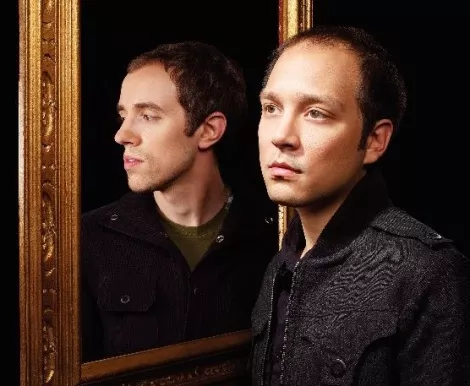
The Helio Sequence like us. They really like us. The tour for their most recent album, Keep Your Eyes Ahead (Sub Pop), wrapped two months back, and they’ve been holed up writing and recording in Portland ever since. That off-cycle creative time is precious, but when Will Sartain called to ask Brandon Summers (guitar, harmonica, vocals) and Benjamin Weikel (drums) to play a one-off in Salt Lake City to close out the City Weekly Music Awards, they said OK—just for us!
Really. There are no other Helio Sequence shows booked until June, when they’ll tour the U.K. with Keane. We’re special. Here’s why:
“We love Salt Lake City,” says Summers. Doesn’t every band say that? It’s no stroke. THS met Sartain when he booked Kilby Court in “2001 or 2002, right after Young Effectuals came out.” Sartain’s band Redd Tape opened the show, and they struck up a friendship. “Ever since then, it’s been one of our favorite places to play in the whole country.”
Go ahead and enjoy the warm fuzzies for a second. It’s nice to be wanted, especially by a cool band—a loud, loud band whose songs incorporate the whiz-bleep gadgetry of electronic music pioneer Bruce Haack, melodic sensibility of little-known melodymakers Lennon and McCartney, and just a spiritual touch of The Black Keys’ Thickfreakness. And that’s before The Helio Sequence got really good, in kind of a roundabout way.
It started on tour for their 2004 Sub Pop debut, Love and Distance. Summers’ vocal style, a barbaric, indie-rock yawp-yelp, began to shred his vocal cords. At first, he self-medicated with whiskey—not exactly a “coats, soothes, relieves” remedy—and kept delivering the vox as best he could. Soon, that meant Summers had to cease talking during the day. Eventually, he lost his voice entirely.
“It was a compound of bunch of little things I was doing wrong and over-stressing myself and my voice,” he says.
A post-tour doctor visit led to a compulsory two-month singing moratorium. Summers had to consider the possibility he’d ruined his pipes, but a daily regimen of Throat Coat tea, vocal exercises and jogging set him back on track. He maintains the routine today, considering it “just taking care of myself,” the same way he’d brush his teeth or comb his hair. “I make sure I warm up, and don’t play a show when I haven’t been singing for months at a time. And usually, things are all right.”
The music, however, wasn’t the same. In the downtime, Summers’ and Weikel’s appreciation for songwriting bubbled up to the surface. The songs became less baroque, with the effects dialed down so the lyrics were more audible. Turns out, Summers had more of a voice, figuratively speaking, than he or we thought.
The subsequent album, Keep Your Eyes Ahead, was a feast for fans. The electronic elements remained, albeit with a drowsy, ambient presence, that underscored a more vivid indie-rock sound that incorporates Brit-pop and Tim Buckley folk. “It was an opportunity to be stripped of everything and to rebuild—not just my voice, but my creativity.
To rebuild the way I think about creation,” Summers says. “Benjamin and I write songs together and that influenced a lot of the music [on that album].”
As the two wrote for Keep Your Eyes Ahead—and continue to write for the new, as-yet-untitled album—they’re more conscious of songs and arrangement. Part of that comes from the band’s self-production ethos.
“It’s not just writing, but knowing what makes a recording work or not work. And you just become more conscious of these things over time,” Summers says. “In looking at songs in general, something that has a deeper meaning, a lyrical meaning, stands up stronger over time than something that has cool sounds or a cool beat. There’s a lot more going on in a song, and the further we go in our writing, the more we concentrate on that side of things.”
The new songs have opened up a whole new world for Summers and Weikels. With the themes up-front, their fans identify more personally with the material. “Fans come up and actually wanna talk about something that was in a song, or just talk in general,” Summers says. It’s something that happened before to The Helio Sequence, but not to such an extent. Fans approach Summers and Weikels to share personal stories that the musicians feel they’d ordinarily share only with trusted friends.
“The songs you write,” says Summers, “are an indication of who you are. People feel that they know you a lot better. Which is interesting for me. It’s actually very flattering that they get so personal and very open. That means a lot to me. That’s what music is about. I feel like I know, almost personally, the people that create the music that I love. I probably don’t, but it’s that feeling when you actually connect with something.”
When The Helio Sequence returns to town this week, the lovefest will undoubtedly progress.
CWMA CLOSING PARTY W/ THE HELIO SEQUENCE
The Depot
400 W. South Temple
Saturday, Feb. 20
8 p.m.